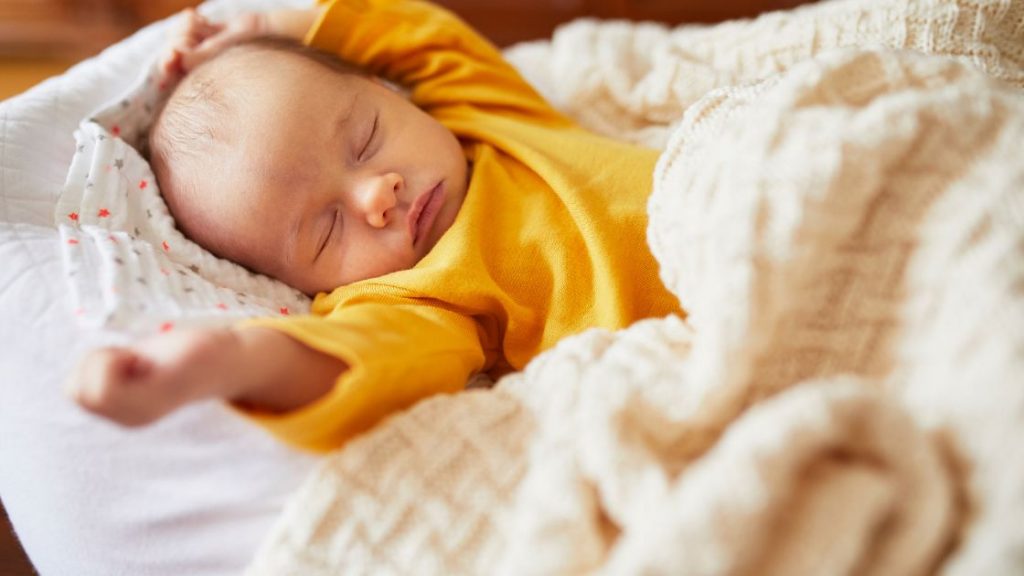Sleep training for children is one of the essential things that parents need to know to ensure their baby has a good night's sleep and comprehensive development. It is one of the critical things to help children become more confident and independent from an early age.
However, sleep training for children is not easy, and many parents fail to do this. Some parents have successfully trained their children to sleep, but the child wakes up at night after a while. It is a sign that parents have failed sleep training and used improper sleep training methods.
This article will give parents the best overview of sleep training, why sleep training fails, and notes when applying sleep training methods.
What Is Sleep Training?

Sleep training is the process of helping a baby fall asleep on his own. During sleep training, the baby doesn't need the mother to hold or lull them to sleep and will sleep without waking up in the middle of the night.
Does Sleep Training Ever Fail?
The sleep training process's failure can be caused by external factors or by the parents' ineffective sleep training methods.
Many mothers share that their children sleep very well in the first few days when they practice sleeping. However, a few days later, the baby started crying again, waking up in the middle of the night, sometimes coaxing him to refuse sleep. It is a sign that your baby's sleep training has failed.
In addition, sleep training may fail because parents choose the wrong time to sleep. Note that sleep training should not be given to children in the following cases:
3 Signs When Sleep Training Fails

Before we get into why sleep training fails, let's look at the signs that sleep training is failing. Persistent sleep problems can handle many forms, but most of the following seem to persist even after sleep training is performed:
Why Does Sleep Training Fail: 3 Possible Reasons
Sleep training can be unsuccessful for 3 reasons below:

Feed your baby or shake him to put him to sleep
Quite a few people make this mistake when starting as a mother. Newborns often fall asleep after each feed because every 2-3 hours, they need a feed again, and their bedtime is quite messy. It's entirely normal for babies to fall asleep after each feed because that's how babies adapt to life outside the mother's body.
According to medical doctor Ari Brown, a consultant for parenting advice site Parents and author of the book Baby 411: "In the first few months of life, babies don't immediately adapt to life outside. However, from the 4th month onwards, the child's nervous system gradually develops, and the child begins to form the habit of sleeping at a fixed time."
Then, if the mother can only put the baby to sleep by feeding or shaking the baby, problems will arise. "Newborns usually wake up two to six times a night, so you'll have to constantly feed or shake your baby to put him back to sleep every time he's fussy," says psychologist Jodi Mindell, a clinical psychologist.
The sleeping environment is not optimal enough
The sleeping environment plays an essential role in sleep training for children. In a cramped environment, too hot or too cold temperatures and intense light will make your baby irritable, sleep poorly and wake up quickly.
Parents should ensure the child's sleeping environment: dark, relaxed and free of obstructions (especially blankets and stuffed animals). It is better to use a crib and a separate room.
Lack of perseverance and consistency
Our baby is not a machine, and each baby is a different individual. No two babies are the same. So don't be too hasty in sleep training for your baby.
Many mothers who have only applied a habit for a few days are frustrated when their baby can't fall asleep on his own. However, moms should know that children must go through a cognitive-rejection-acceptance phase. This stage lasts about 5-7 days; even with sensitive or irritable babies can last up to 3 weeks.
When Sleep Training Getting Worse: 3 Things To Check
When baby sleep training gets worse, parents need to check these things:

Self-asking: Am I patient enough?
Sleep training for babies needs a lot of patience and perseverance from parents. Science proves that learning new habits takes about 60-90 days. Baby sleep training isn't long because babies can practice within 3-4 days.
However, babies need more time to maintain that habit. Therefore, parents need to be persistent and not force their children to bring good effects to both parents and children.
Check the temperature, and light in the room
Temperatures that are too low or too high and strong light can affect your baby's sleep and development. Therefore, before sleep training or when sleep training fails, parents should carefully check the temperature and light in the room and adjust them to suit their children.
Check sleep time
To ensure a better night's sleep, ensure you don't put your child to bed too early or too late. No matter how busy you are, ensure your child goes to bed at a fixed time during sleep training. Consider and find out what time is right for your child and maintain that bedtime for a long time to bring the maximum effect.
Check your child's daytime naps
Your baby's daytime nap is essential in sleep training and improving your baby's nighttime sleep. Experts encourage parents to enhance their child's daytime naps before considering their child's nighttime sleep.
If your baby is a poor napper, they will often get tired when they go to bed at night. Sleep training will fail when a child is not in the best position for sleep training due to excessive fatigue.
The same can happen if your child sleeps too much during the day, their last nap is too long, or too close to bedtime.
Therefore, parents need to ensure that their children nap enough and deep sleep; naps need the right time and time.
FAQs About Sleep Training Getting Worse
Some issues that parents may ask about in the process of baby sleep training:
Which night of sleep training is the hardest
For most sleep training methods, babies cry the most on the second or third night. Children realize they have to get used to a new routine.
How long does it take for sleep training to work?
Babies can practice sleeping within 3-4 days. However, successful sleep training can take weeks or even months, depending on the parents' method, sleeping space, and persistence.
Can sleep training get worse before it gets better?
Sleep training can completely get worse before it gets better because sleep training can disorient your child. Children will cry and resist approaching the new routine, so failure is inevitable.
Moreover, the initial failure of sleep training can help parents learn from experiences and understand their children better, thereby offering successful sleep training methods.

Closing
Above is information about sleep training getting worse, its causes, and things parents need to know to draw experience when training their children to sleep.
In summary, parents should not give their children a full meal before going to sleep and need to be patient in the process of sleeping training for children. And to ensure sleep, you need to check the light carefully, room temperature, sleep time, and your child's daytime snap.
Hopefully, the article will help parents get the necessary information about sleep training.

